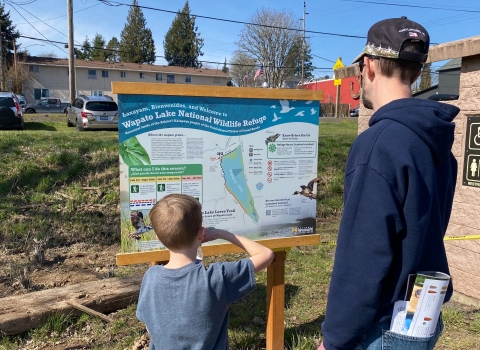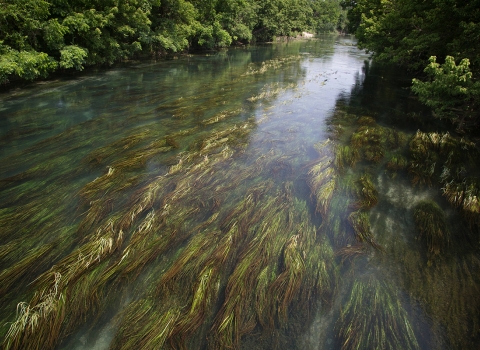The U.S. Fish and Wildlife Service (Service) today announced recipients of the 2011 Recovery Champion award, which honors Service employees and partners for outstanding efforts to conserve and protect endangered and threatened species of fish, wildlife, and plants. A total of 56 teams and nine individuals were honored as Recovery Champions for work to conserve species ranging from the polar bear in Alaska to the Appalachian elktoe mussel and spotfin chub in North Carolina.
“Recovery Champions are helping listed species get to the point at which they are secure in the wild and no longer need Endangered Species Act protection,” said Service Director Dan Ashe. “These groups and individuals have done amazing work in helping to bring dozens of species back from the brink of extinction, while improving habitat that benefits many other species and local communities.”
For example, the Turner Endangered Species Fund (TESF) is being recognized for its work in endangered species recovery programs over several decades. Numerous species across multiple states such as the black-footed ferret, red-cockaded woodpecker, Chiricahua leopard frog and Northern Aplomado falcon have greatly benefitted from TESF’s continued support over the years and are on the road to recovery thanks in large part to these efforts.
“I am very pleased to see the important work accomplished by our Partners for Fish and Wildlife Program in Texas being acknowledged with this award,” said Benjamin Tuggle, U.S. Fish and Wildlife Service Southwest Regional Director. “Additionally, the conservation contribution made by the Turner Endangered Species Fund is significant for many species throughout the country, but especially to our Mexican Wolf Recovery Program.”
Notably, the TESF has been active and supportive in gray wolf recovery in the United States, both in the Northern Rocky Mountains and in the Southwest. Since 1997, the Ladder Ranch Wolf Management Facility, located on R.E. Turner’s Ladder Ranch in south-central New Mexico and operated by TESF is one of three primary captive pre-release facilities in the U.S. for the Mexican Wolf Recovery Program and has been instrumental in housingMexican wolves for release to the wild.
In Texas, the Service’s Partner’s for Fish and Wildlife Program (PFW) Team was recognized for their ongoing efforts to work with private landowners on behalf of listed species. Since the Program’s inception in Texas in the early 1990s, well over 100 private landowner agreements have been signed. Working with private landowners, the Texas PFW program has helped increase populations of the golden-cheeked warbler, black-capped vireo, and Attwater's greater prairie-chicken. For the Arkansas River shiner and the least tern, the Texas PFW program’s accomplishments have focused on removing invasive salt cedar; for the Louisiana black bear, on improving bottomland hardwood; and for the red-cockaded woodpecker, restoring longleaf pine through the initiative of the Natural Resources Conservation Service (NRCS). For the whooping crane, NRCS responded to the Texas PFW recommendation to protect important coastal wetlands through permanent conservation easements on 11,000 acres! The program has also helped restore habitat for the Houston toad through the use of prescribed burns.
Restoring streams, releasing listed species into their historical ranges, and conducting field surveys and monitoring programs are among the diversity of initiatives by this year’s Recovery Champions. What began in Fiscal Year 2002 as a one-time award for Service staff members for achievements in conserving listed species was reactivated in 2007 and expanded to honor Service partners as well, recognizing their essential role in the recovery of threatened and endangered species.
For information about the 2011 Recovery Champions, please visit: http://www.fws.gov/endangered/what-we-do/recovery-champions/index.html.
America’s fish, wildlife and plant resources belong to all of us, and ensuring the health of imperiled species is a shared responsibility. To learn more about the Service’s Endangered Species program, go to http://www.fws.gov/endangered/.



